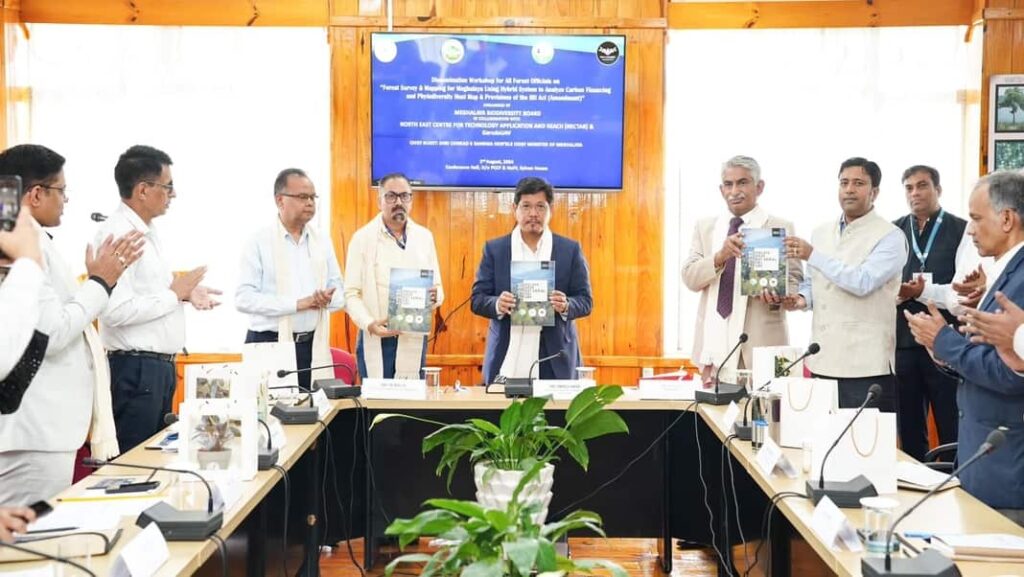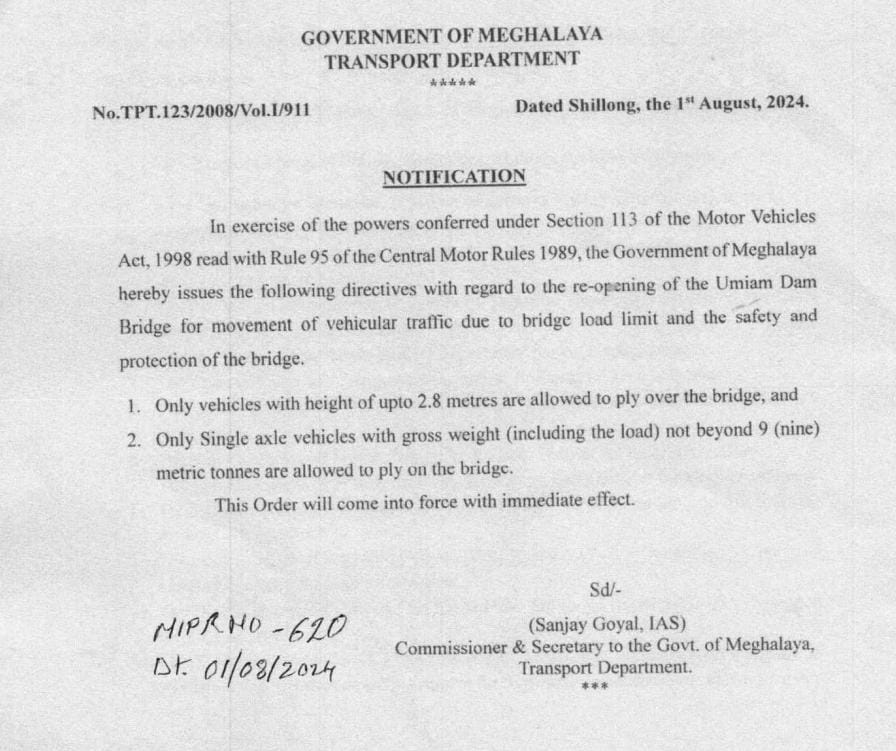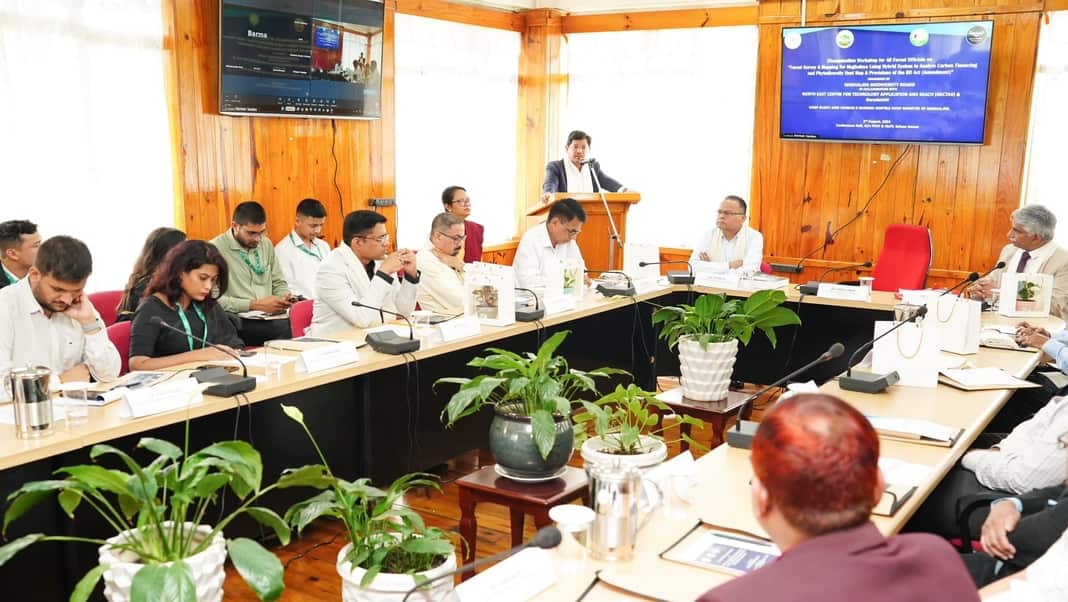Shillong, Aug 2: Meghalaya Chief Minister Conrad K. Sangma on Friday said it is proposing to designate ecological regions in the Northeast as Special Climate Action Zones, akin to India’s Special Economic Zones.
“This initiative aims to provide incentives and subsidies for climate-sensitive brands, products, and organizations, promoting sustainable business practices. Our climate ambitions in Meghalaya go beyond mere conservation; we see climate action as an opportunity to create viable economic models” Sangma said here on Friday at a Dissemination Workshop for forest officials on “Forest Survey & Mapping for Meghalaya Using Hybrid System to Analyse Carbon Financing and Phyto-diversity Heat Map & Provisions of the BD Act (Amendment).

He released a report on “Forest Survey & Mapping for Meghalaya Using Hybrid System to Analyze Carbon Financing and Phyto-diversity Heat Map”.
“The state’s unique forest economy, characterized by vibrant ecological and biotic regimes, is part of India’s largest carbon sinks, crucial for carbon sequestration and climate change mitigation. However, Meghalaya is also among the regions most at risk from climate change impacts in the Northeast,” he said.
He said Meghalaya’s new framework involves creating an inventory of its natural assets and assessing the economic value of its ecosystem services. “This approach will help develop innovative financial tools and secure funding for conservation efforts, establishing a new revenue model around nature conservation and climate action, from carbon farming and regenerative agriculture to monetizing ecosystem services of forests,” he said.

He said the state’s decision join the global Under2 Coalition is a significant step in its effort to mitigate climate change impacts and promote sustainable development. The Under2 Coalition, is a network committed to achieving net-zero emissions by 2050.
He announced that Meghalaya is only the seventh state to join Under2 Coalition. “Meghalaya, part of the Indo-Burma biodiversity hotspot, is vital for conservation, acting as a significant carbon sink alongside Arunachal Pradesh,” he said.
The Biological Diversity Act, 2002, enacted by the Indian Parliament, serves as the foundation for this mission, aiming to conserve biological diversity, ensure sustainable use, and promote equitable sharing of benefits derived from traditional biological resources and knowledge.

The recent 2023 amendment to the Biological Diversity Act has further bolstered the regulatory framework, enhancing local community participation. Key features of this amendment include streamlined approval processes for accessing biological resources, simplified research and development procedures, and reinforced mechanisms for benefit-sharing with local and indigenous communities. These changes aim to promote the sustainable and inclusive use of biodiversity while providing greater legal clarity and ease of compliance.
“In Meghalaya, these provisions are critical given the state’s unique flora and fauna, which hold immense ecological, cultural, and economic value. The Act’s implementation will help protect these resources from exploitation and ensure that local communities benefit from their sustainable use. The establishment of 6,484 Biodiversity Management Committees (BMCs) across villages and urban areas has been a significant step in empowering local communities,” he said.

“These committees play a crucial role in documenting biological resources and traditional knowledge, facilitating access and benefit-sharing agreements, and fostering conservation initiatives. The 2023 amendment further empowers these committees, ensuring that local communities’ voices and interests are integral to decision-making processes,” he added.
He said recent advancements in survey technologies have further enhanced Meghalaya’s conservation efforts. “These cutting-edge methods have provided an in-depth analysis of Meghalaya’s forest biodiversity, health, and environmental challenges. LiDAR technology enables the creation of high-resolution, three-dimensional maps of forest structure, offering precise species identification and detailed analysis of canopy height, density, and composition,” he said.

“These advanced survey techniques have significant implications for forest management and conservation. Detailed species and vegetation health data can aid in developing more effective conservation strategies, enforcing land-use regulations, and planning sustainable development. Accurate quantification of carbon stocks supports carbon financing initiatives, providing a sustainable funding source for reforestation and conservation projects,” Sangma added.
Also Read: Asokgre villagers in South Garo Hills plead for help after 2-month network blackout
Watch
Find latest news from every corner of Northeast India at hubnetwork.in, your online source for breaking news, video coverage.
Also, Follow us on-
Twitter-twitter.com/nemediahub
Youtube channel- www.youtube.com/@NortheastMediaHub2020
Instagram- www.instagram.com/ne_media_hub





